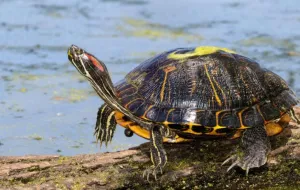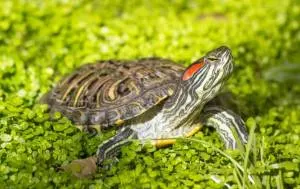
Table of Contents
Scientific Classification
- Kingdom: Animalia
- Phylum: Chordata
- Class: Reptilia
- Order: Testudines
- Family: Emydidae
- Genus: Trachemys
- Species: Trachemys scripta elegans
Quick Overview
The Red-Eared Slider (Trachemys scripta elegans) is a widely recognized and popular aquatic turtle species, known for its distinctive red stripe behind each eye. Native to the central and southeastern United States, these turtles have become one of the most common pet turtle species globally, captivating enthusiasts with their engaging behavior and striking appearance.
Fast Facts
- Scientific Name: Trachemys scripta elegans
- Lifespan: Can live for several decades, with some individuals reaching over 30 years in captivity.
- Average Size: Adult Red-Eared Sliders typically have a shell length of 6 to 8 inches, although some can grow larger.
- Diet: Omnivorous, consuming a varied diet that includes aquatic plants, small fish, insects, and commercial turtle pellets.
- Habitat: Aquatic, found in freshwater environments such as ponds, lakes, and slow-moving rivers.
Did you know?
The distinctive red “ears” of Red-Eared Sliders are not ears at all. They are markings located on the sides of their heads, and their actual ears are internal, concealed by skin and bone.
Appearance
Red-Eared Sliders have a recognizable appearance with a smooth, oval carapace (upper shell) that ranges in color from olive green to dark brown. Their plastron (lower shell) is typically yellow with intricate dark markings. The red stripe behind each eye is a distinguishing feature, and males often have longer front claws than females.
Size and Weight
The size of Red-Eared Sliders can vary, but they generally reach a shell length of 6 to 8 inches. Some individuals may exceed 12 inches in length, and their weight can range from 2 to 5 pounds.
Temperament and Behavior
Red-Eared Sliders are known for their active and inquisitive nature. While they may bask on rocks or logs for extended periods, they are also adept swimmers. Captive turtles can become accustomed to their owners and might even recognize them at feeding times.
Fun Fact
Red-Eared Sliders are excellent baskers. They often stretch out their limbs and tilt their bodies to absorb sunlight efficiently, a behavior crucial for maintaining their overall health.
Habitat and Distribution
In the wild, Red-Eared Sliders are found in freshwater habitats across the central and southeastern United States, from Illinois to the Gulf of Mexico. Due to their popularity in the pet trade, they have been introduced to various other regions, sometimes impacting local ecosystems.

Care Guide
For those interested in keeping Red-Eared Sliders as pets:
- Enclosure: Provide a spacious aquatic habitat with a basking area, UVB lighting, and a water filtration system.
- Temperature: Maintain a basking area temperature around 85-90°F (29-32°C) and water temperature around 75-80°F (24-27°C).
- Diet: Offer a varied and balanced diet, including commercial turtle pellets, leafy greens, insects, and occasional treats like aquatic plants.
- Health Check-ups: Regularly monitor your pet’s health, including shell condition, and provide veterinary care when needed.
Diet and Nutrition
Red-Eared Sliders are omnivores with a varied diet. In captivity, they can be fed a combination of commercial turtle pellets, leafy greens, aquatic plants, and protein sources like insects or small fish.
Health and Wellness
Maintaining proper water quality, a balanced diet, and offering suitable basking opportunities are essential for the overall health and well-being of Red-Eared Sliders.
Reproduction
Red-Eared Sliders reproduce by laying eggs, usually in a nest dug in sandy soil. Female turtles may lay multiple clutches of eggs throughout the breeding season.
Conservation Status
While Red-Eared Sliders are not considered endangered, their popularity in the pet trade and potential impact on local ecosystems when released into the wild have raised concerns. Responsible ownership and proper care are crucial to mitigate potential environmental issues.
Photo Gallery




Related Profiles
Share This Profile
Three Amazing Facts About Red-Eared Sliders
- Temperature-Dependent Sex Determination: The temperature at which Red-Eared Slider eggs are incubated influences the sex of the hatchlings. Warmer temperatures typically result in female turtles, while cooler temperatures produce males.
- Unique Shell Growth Rings: Red-Eared Sliders display growth rings on their shells, similar to tree rings. By counting these rings, scientists can estimate their age and understand patterns of growth and environmental conditions.
- Longevity: With proper care, Red-Eared Sliders can live for several decades. Their potential lifespan makes them a long-term commitment for turtle enthusiasts.
- Enchi Ball Python: A Unique and Stunning Morph of Python regius - March 27, 2025
- Emerald Tree Monitor: The Enigmatic Green Guardian of the Rainforest - March 26, 2025
- The Egyptian Cobra (Naja haje): A Fascinating Serpent - March 25, 2025
